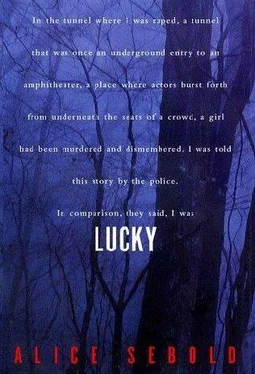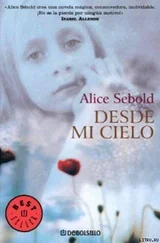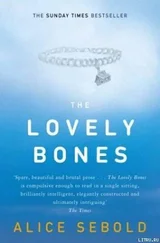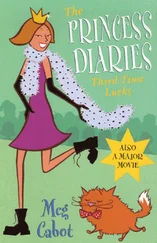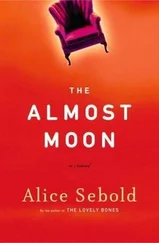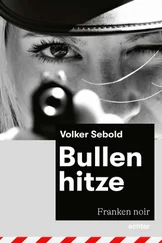In late summer, after my father had returned from Spain, the three of us were out in the yard doing yard work. I was supposed to ride the ride-on mower. A typical Sebold fight erupted. I didn't want to, etc. Why did Mary get to go live in D.C. and then go to Syria? My father called me ungrateful. It escalated. Suddenly, just as it was traveling down the familiar path to all-out shouting, I burst into tears. I started crying but couldn't stop. I ran inside up to my room. Trying to sop up the tears was futile. I cried until I was spent, dehydrated, my eyes and the flesh around them a site map of broken capillaries.
Later, I didn't want to talk about it; I was putting the rape and the trial behind me.
Lila and I wrote back and forth to each other all summer. She was dieting too. Our letters to one another read like journal entries, long, pondering pieces written to have company during the writing as much as to really share any information bulletins about ourselves. We were hot and bored, nineteen and stuck at home with our parents. We told each other our life stories in those rambling letters. How we felt about everything from our individual family members to boys we knew at school. I don't remember writing her about the trial in detail. If I did, her letters don't reflect it. I got one postcard in the early summer congratulating me. That's it. It disappeared from our landscape after that.
As it did from almost everyone's. The trial seemed to have provided a very solid and heavy back door to the whole thing. Anyone who had actually entered that house with me, looked or walked into the rooms there, was very happy to finally leave the place. The door was shut. I remember agreeing with my mother that I had gone through a death-and-rebirth phenomenon in the span of one year. Rape to trial. Now the land was new and I could make of it anything I wished.
Lila, Sue, and I planned, via our letters, for the coming year. Lila was bringing a kitten down from a litter at home. I had made a pact with my mother: If I jumped up and down enough on a couch that she hated, we might convince my father when he returned from Spain that I should take it to school. I rented a truck with Sue, who lived nearby. My mother was cheery and sent me off with new clothes that fit my new figure. This was going to be the turnaround year. I was going to do what I called "live normal" now.
That fall, Mary Alice was in London in an exchange program. So were other friends. Tess was on leave. I missed them only vaguely. Lila was my living, breathing soul mate. We went everywhere together and cooked up crazy schemes. We both wanted boyfriends. I played the role of the experienced one to Lila's innocent. Over the summer I had made us matching skirts. We wore these and anything black whenever we went out.
Ken Childs was at a loss without Casey, who was also in London, and we began to pal around. I thought he was cute and, the most important fact, he already knew about me. The three of us went dancing together at on-campus clubs and art-student parties. I wanted to be a lawyer now. People liked hearing this ambition so I said it a lot. Because of Tess, I wanted to go to Ireland; I told people that too. I went to poetry and fiction readings and indulged in the wine and cheese. I took an independent study in poetry with Hayden Carruth and an independent with Raymond Carver, whom I've always thought Tess had assigned to baby-sit me.
One day I ran into Maria Flores on the street. I had written her a triumphant letter early in the summer about the trial. I told her that I had felt her there with me in the courtroom and that I hoped she could take some solace in this. Her letter back was, to be honest, too real for me. "I have a brace on my leg. My ankle is healed and I walk with a cane due to nerve damage. My suicidal tendencies have lessened though frankly, they aren't all gone." She worried about her cane inhibiting her from meeting new people and felt ashamed that she had not completed her job as a resident advisor. She ended the letter with a quote from Kahlil Gibran:
"We are all prisoners but some of us are in cells with windows and some without."
I couldn't see it for years but if one of us had a window, it was Maria who was looking out.
"I got off scot-free," I remember saying to Lila. "She'll wear the rape eternally."
I was dancing and falling in love. This time, a boy in Lila's math class: Steve Sherman. I told him about the rape after we had gone to see a movie and had a few drinks. I remember that he was wonderful with it, that he was shocked and horrified but comforting. He knew what to say. Told me I was beautiful, walked me home and kissed me on the cheek. I think he also liked taking care of me. By that Christmas, he became a fixture at our house.
At home my mother was on an upswing too. She was trying new drugs, Elavil and Xanax, and even biorhythm therapies, things she had never considered before. Group therapy was on the horizon. My mother trusting someone other than herself. "You inspire me, kiddo!" she wrote. "If you can go through what you did and go back out, I figure this old gal can too."
I had reached some positive ground zero; the world was new and open to me.
I worked on the literary magazine, The Review, and was chosen to be editor when I became a senior. The English department asked me to represent them in the Glascock Poetry Competition, which was held annually at Mount Holyoke College.
Years before, my mother had fled Mount Holyoke, leaving behind a fellowship for graduate school. She recalls that it felt like a death sentence to her. All her friends were getting married and she, the egghead, was going off to a place full of "nuns and lesbians."
So I went back to reclaim something for my mother and to take the stage for rape. I didn't win. I came in second. I read "Conviction." Reading it aloud had made me shake with it, the truth of my hate. One of the judges, Diane Wakoski, took me aside and told me that subjects like rape had a place in poetry but that I would never win the prizes or cultivate an audience at large that way.
Lila and I thrilled at stupid movies and we saw one the day I got back from Massachusetts, Sylvester Stallone in First Blood. It played at the fifty-cent movie theater near our house. We laughed hysterically at the cartoonish action on the screen in front of us, guffawing so hard we were crying and could barely see or breathe. We would have been kicked out if anyone else had been in the theater to complain but we were alone in the old run-down movie house.
"Me Rambo, you Jane," Lila said, and beat her chest.
"Me good muscle, you girl muscle."
"Grrr."
"Tee-hee."
Near the end of the film someone cleared his throat quite audibly. Lila and I froze but kept staring at the screen. "I thought we were alone," she whispered.
"So did I," I said.
We kept it down and attempted a respectful silence during the final raging shoot-out scenes. We did this by digging our nails into each other's arms and biting our lips. We giggled but we did not erupt fully.
When it was over, and the lights went up, we were alone again. We started letting out what we had held back until we turned the corner and saw the manager of the theater standing there.
"You think Vietnam is funny?"
He was an imposing man; muscle gone to fat and with a pencil mustache that slid across his upper lip, like Madison's first attorney.
"No," we both said.
He blocked our way to the exit.
"Certainly sounded like you were laughing to me," he said.
"It's pretty exaggerated," I said, expecting him to see my point.
"I was in 'Nam," he said. "Were you?"
Lila was scared and holding on to my hand.
I said, "No, sir, and I respect the veterans that fought. We didn't mean to offend. We were laughing because we found the level of machismo exaggerated."
Читать дальше
